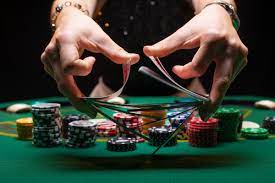Casinos: these bustling hubs of excitement, intrigue, and, most importantly, chance, jedi96 have captivated human fascination for centuries. From the opulent halls of Monte Carlo to the neon-lit streets of Las Vegas, casinos have been synonymous with glamour, risk, and the allure of instant wealth. But beyond the glitz and glamour lies a complex world that combines psychology, mathematics, and entertainment in a unique blend that keeps millions of visitors coming back for more. Let’s delve into the enigmatic realm of casinos and explore what makes them tick.
The Anatomy of a Casino
A casino is not merely a place to gamble; it’s a meticulously crafted environment designed to entice, engage, and ultimately, extract value from its patrons. Every aspect of a casino, from its layout to its lighting, from its décor to its music, is carefully orchestrated to create an immersive experience that keeps players engaged for hours on end.
One of the most crucial elements of a casino’s design is its layout. Casinos are often labyrinthine structures, intentionally designed to disorient patrons and keep them wandering the gaming floor for as long as possible. The strategic placement of slot machines, table games, and amenities is intended to encourage exploration and maximize exposure to the casino’s offerings.
In addition to its layout, a casino’s ambiance plays a significant role in shaping the player experience. The sights and sounds of a casino are carefully curated to evoke feelings of excitement and anticipation. The cacophony of slot machines, the clinking of chips, and the cheers of winners all contribute to the electrifying atmosphere that pervades the gaming floor.
The Mathematics of Chance
At the heart of every casino game lies the mathematics of probability. Whether it’s blackjack, roulette, or craps, each game is governed by a set of rules that dictate the likelihood of certain outcomes. Understanding these probabilities is essential for players looking to maximize their chances of success.
Take, for example, the game of roulette. At first glance, it may seem like a game of pure chance, with each spin of the wheel being entirely independent of the last. However, a closer examination reveals a more nuanced picture. By analyzing the layout of the wheel and the distribution of numbers, players can gain insights into the probabilities of different outcomes and adjust their bets accordingly.
Similarly, in games like blackjack and poker, players jedi96 can use mathematical strategies to improve their odds of winning. By memorizing basic strategy charts and understanding the principles of probability, players can minimize the house edge and increase their chances of coming out ahead in the long run.
The Psychology of Gambling
In addition to its mathematical underpinnings, gambling is also deeply intertwined with human psychology. The thrill of taking risks, the allure of potential rewards, and the adrenaline rush of uncertainty all contribute to the addictive nature of gambling.
Casinos leverage these psychological factors to keep players engaged and coming back for more. Everything from the layout of the gaming floor to the design of the games themselves is carefully calibrated to exploit cognitive biases and encourage impulsive behavior.
For example, slot machines are specifically engineered to trigger the brain’s reward system, creating a sense of euphoria with each win, no matter how small. The intermittent reinforcement schedule employed by slot machines, where wins are unpredictable and sporadic, keeps players hooked and eager to continue playing.
The Future of Casinos
As technology continues to evolve, so too does the jedi96 industry. From virtual reality gaming to mobile betting apps, casinos are constantly exploring new ways to engage players and enhance the gambling experience.




